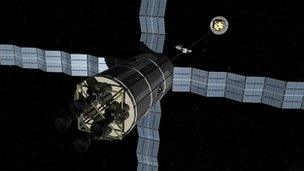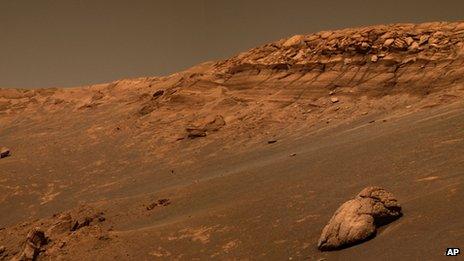Mars Mission: Martin Archer answers your questions
- Published

One of Earth's closest neighbours, Mars, is still at least 56 million km away - so what would it take to put a human on the Red Planet? The BBC asked scientists from Imperial College London to design a mission which could land crew on Mars and get them back safely.
They came up with a spinning spacecraft to create artificial gravity on the nine-month trip, combating bone loss and muscle wastage. A shield would be needed to protect against radiation from the Sun and cosmic rays. A robot sent ahead of the mission would generate fuel from the Martian ice for the return journey.
Imperial College physicist Martin Archer answered your questions about the Red Planet in a Twitter Q&A.
Here is an edited version of the session which was held on Wednesday 24 July 2013.
Question, external from @mobzi_malone: What's the fastest a spacecraft can travel with people in? Is 9 months the shortest journey time? #BBCMars
Martin answers: , external9 months is the time it takes if you let gravity do most of the work so you don't need as much fuel #BBCMars
Question, external from @SJSumner: How fast (rpm) would the tethered landing and habitat modules be rotating to create an earthlike gravity? #BBCMars
Martin answers:, external Because of our 60m tether we only need a 3rpm (20s rotation period) to simulate Earth gravity. #BBCMars
Question, external from Jav Hidalgo via email: I was just wondering if you thought that a crew of three is enough? #BBCMars
Martin answers, external: 3 people is based on the ISS expeditions, though there are 2 at a time. With more people you need more resources on the way! #BBCMars
Question, external from @A_M_Swallow: How are you going to power the ground installations? Nuclear? #BBCMars
Martin answers:, external We've decided to simply use giant solar panel arrays. Nuclear is not ideal for manned missions. #BBCMars
Question, external from Brian via email: Where is the energy to electrolyse the water for the return trip fuel going to come from? #BBCMars
Martin answers:, external We make methane rocket fuel by hydrolysing water and combining with CO2 in Martian atmosphere, this would be solar powered #BBCMars
Question, external from @B_R_Moss: How much thicker would the Martian atmosphere have to be for astronauts to be able be outside w/out pressure suits? #BBCMars
Martin answers:, external Mars's atmosphere would need to be 100x thicker to match Earth's, but it certainly wouldn't be nice and breathable, too much CO2 #BBCMars
Question, external from @Seabird_2: Do you think that the first settlers to Mars will become "aliens" to Earth and will not be able to return home?
Martin answers, external: Mars isn't very hospitable to humans at the moment, so I don't see people settling there long term just yet. #BBCMars
Question, external from @jamesrichwalls: Isn't radiation and the effects of gravity on the body a huge obstacle for any long term human Mars endeavour? #BBCMars
Martin answers:, external You can simulate gravity through spinning. Radiation is still a slight worry, especially solar storms. It'd be a risky trip! #BBCMars
Question, external from @flypie: What about growing food on the way there and on the surface? #BBCMars
Martin answers:, external People have tried to mock this up in remote locations on Earth in bio-domes. A great way of producing oxygen too #BBCMars
Question, external from @bobcrawf: How difficult is entry into the Mars atmosphere attempting a landing compared to Earth re-entry? #BBCMars
Martin answers:, external Landing on Mars is a lot more difficult than on Earth or even the Moon. It has a thin atmosphere but dust storms too. #BBCMars

The surface of Mars taken by the Mars rover Opportunity
Question from: , external@jamesrichwalls: Have the psychological factors, attributed with long term space travel, been fully addressed? #BBCMars
Martin answers, external: The Russians did a mock Mars mission on the ground to see about this, but you can't fake the real psychological effects. #BBCMars
Question, external from @simon_rp84: Do you think that existing launch vehicles are suitable, or will new concepts need to be developed for Mars? #BBCMars
Martin answers:, external Current rockets, particularly say SpaceX's Falcon series, have the capabilities of sending fairly large craft to Mars. #BBCMars
Question, external from @tfprophet: Realistically, what are the prospects of ever being able to 'terraform' planets, particularly Mars? #BBCMars
Question, external from @ddetisi: Could we ever influence or improve the atmosphere to make it habitable? Even over a long period of time? #BBCMars
Martin answers:, external People have thought about terraforming Mars and making it more habitable. I don't think we really have the technology yet. #BBCMars
Question, external from @adrianstrand: Should humans hone tools & techniques on the Moon first for as long as a Mars mission - as a stepping stone? #BBCMars
Martin answers:, external People have thought about using the Moon as a fuelling station for longer trips. But it is quite a different place to Mars. #BBCMars
Question, external from @NickF75: In case of space craft problems, has any thought gone into sending a spare craft to await in Mars orbit? #BBCMars
Martin answers:, external Our concept mission actually sends robotic craft beforehand to monitor the planet and start making fuel for the trip home. #BBCMars
Question, external from @Gturv: How do you cope with unexpected medical emergencies on long space flights? Appendix etc? #BBCMars
Martin answers:, external Astronauts would have health monitors on at all times and would have some medical training. Experts on Earth could help too. #BBCEarth
Question, external from @pault14761: What's the minimum time you'd have to stay on Mars, to be able to have a nine-month journey back to Earth? #BBCMars
Martin answers: , externalYou'd need to wait 3 months for Earth to be in the right place relative to Mars to return. Otherwise it'd be an 18 month wait. #BBCMars
Question, external from @tikiteyboo: Could a small earth-like magnetic field be used to protect the crew from cosmic rays? #BBCMars
Martin answers:, external A magnetic field would be good for protecting against solar particles, some cosmic rays could probably get through like on Earth #BBCMars
Question, external from @asteven5: When do you think the first human might actually walk on the surface of Mars? #BBCMars
Martin answers:, external It would take probably 20 years or so just to build our concept mission and get to launch #BBCMars
Question, external from @RupertM4 : Will we ever go zero gravity skiing on the north pole of mars? #BBCMars
Martin answers:, external Mars's gravity is about a third of the Earth's so you could potentially go skiing but it'd take longer to build up speed #BBCMars
Twitter Q&A produced by Jeremy Gahagan
- Published24 July 2013
- Published22 July 2013